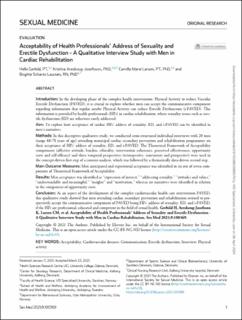| dc.description.abstract | Introduction: In the developing phase of the complex health intervention: Physical Activity to reduce Vascular Erectile Dysfunction (PAVED), it is crucial to explore whether men can accept the communicative component regarding information that regular aerobe Physical Activity can reduce Erectile Dysfunction (i-PAVED). This information is provided by health professionals (HPs) in cardiac rehabilitation, where sexuality issues such as erec- tile dysfunction (ED) are otherwise rarely addressed.
Aim: To explore how acceptance of cardiac HPs’ address of sexuality, ED, and i-PAVED can be identified in men’s narratives.
Methods: In this descriptive qualitative study, we conducted semi-structured individual interviews with 20 men (range 48-78 years of age) attending municipal cardiac secondary prevention and rehabilitation programmes on their acceptance of HPs’ address of sexuality, ED, and i-PAVED. The Theoretical Framework of Acceptability components (affective attitude, burden, ethicality, intervention coherence, perceived effectiveness, opportunity costs and self-efficacy) and three temporal perspectives (retrospective, concurrent and prospective) were used in the concept-driven first step of a content analysis, which was followed by a thematically data-driven second step.
Main Outcome Measures: Men anticipated and experiential acceptance was identified in six out of seven com- ponents of Theoretical Framework of Acceptability.
Results: Men acceptance was identified as “expression of interest,” “addressing sexuality,” “attitudes and values,” “understandable and meaningful,” “insights” and “motivation,” whereas no narratives were identified in relation to the component of opportunity costs.
Conclusion: As an aspect of the development of the complex cardiovascular health care intervention PAVED, this qualitative study showed that men attending cardiac secondary prevention and rehabilitation seemed to pro- spectively accept the communicative component of PAVED being HPs’ address of sexuality, ED, and i-PAVED, if the HPs are professional, educated and competent in the field of sexual health. | en_US |

